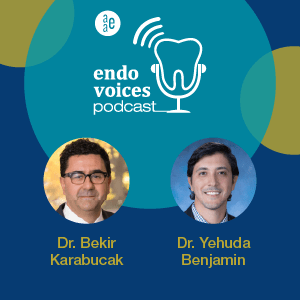Education, Research, and the Future – Ep. 73
 In this thought-provoking Endo Voices episode, Dr. Marcus Johnson welcomes Drs. Bekir Karabucak and Yehuda Benjamin to explore the evolving landscape of endodontic education peering into the shifting dynamics of endodontic education. Together, they examine how residencies are adapting to include vital pulp therapy, regenerative techniques, and technology-driven training—all while emphasizing the enduring value of mentorship and case-based learning. With rising application numbers and a more diverse applicant pool post-COVID, the discussion highlights the need for passion, purpose, and clinical maturity over just numbers and scores. The panel also unpacks the educator shortage, calling for more private practitioners to return to the classroom and pass on their experience. As technology and AI continue to reshape treatment strategies, the speakers stress the importance of preserving core diagnostic and humanistic skills. From debates on one-visit versus two-visit endo to managing interdisciplinary expectations, this episode paints a balanced picture of where the specialty is headed.
In this thought-provoking Endo Voices episode, Dr. Marcus Johnson welcomes Drs. Bekir Karabucak and Yehuda Benjamin to explore the evolving landscape of endodontic education peering into the shifting dynamics of endodontic education. Together, they examine how residencies are adapting to include vital pulp therapy, regenerative techniques, and technology-driven training—all while emphasizing the enduring value of mentorship and case-based learning. With rising application numbers and a more diverse applicant pool post-COVID, the discussion highlights the need for passion, purpose, and clinical maturity over just numbers and scores. The panel also unpacks the educator shortage, calling for more private practitioners to return to the classroom and pass on their experience. As technology and AI continue to reshape treatment strategies, the speakers stress the importance of preserving core diagnostic and humanistic skills. From debates on one-visit versus two-visit endo to managing interdisciplinary expectations, this episode paints a balanced picture of where the specialty is headed.
Episode Resources
- Khalaf, K., El-Kishawi, M., & Al Kawas, S. (2018). Effectiveness of technology-enhanced learning in Endodontic education: A systematic review and meta-analysis. International Endodontic Journal, 51(7), 587–597.
- Kumar, N., Maher, N., Amin, F., Ghabbani, H., Zafar, M. S., Rodríguez-Lozano, F. J., & Oñate-Sánchez, R. E. (2022). Biomimetic approaches in clinical endodontics. Biomimetics, 7(4), 229.
- Asgary, S., & Eghbal, M. J. (2021). Prognosis of vital pulp therapy on permanent dentition: A systematic review and meta-analysis of randomized controlled trials. Journal of Endodontics, 47(10), 1571–1581.
- Ahmed, Z. H., Almuharib, A. M., Abdulkarim, A. A., & et al. (2023). Artificial intelligence and its application in endodontics: A review. Journal of Contemporary Dental Practice, 24(11), 912–917.
Disclaimer
Episodes of Endo Voices may include opinion, speculation and other statements not verifiable in the scientific method and do not necessarily reflect the views of AAE or the sponsor(s). Listeners should use their best judgment in evaluating the merits of any content.




